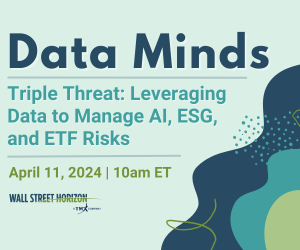Data is perhaps the most important commodity in today’s world. Indeed, some have posited that data is the new oil. This is especially true in financial services, where firms have access to a massive amount of data, but often struggle to glean actionable insight and information out of that.
We recently spoke with Barry L. Star, CEO of Wall Street Horizon, a provider of corporate event data for institutional investors and traders, about how investors can use data to find alpha and gain a competitive edge.
Tell us about Wall Street Horizon
We are a data provider to Wall Street. We provide data around when public companies have corporate and public events – such as earnings calls – and we track when they happen and make them available to our clients. For example if you’re a buy-side asset gatherer and you manage a billion dollars of assets, you need to keep track of everything that is happening with the companies you invest in or may invest in. You can spend all your time reading news articles, company website, press releases and the like, or you can work with a data provider like us. In addition to providing information on when events are scheduled, we also provide our clients with further information they can use to inform their investing strategies – such as if someone spoke at an investor conference about a new product that is coming out.
We also provide both forward-looking and historical datasets, so if a client wants to know when an earnings call was for a specific company three years ago, we can provide that information.
How do traders use your data?
For one thing, it saves them money and enables them to be more efficient; they don’t have to keep track of all this information themselves. Also, this information changes all the time; earnings calls are moved earlier or later, and we keep track all of this.
This is really important - the event revisions component. We provide our clients with timely notice when these events change, which they can then use to make any changes to their investing strategy. They can make changes faster and beat out the rest of the market, and they can do this by analyzing what we call ‘corporate body language’.
Can you explain the concept of corporate body language?
If you think about the concept of body language, it means you can look at someone and just by the way they sit or stand or present themselves you can tell a lot about them before they even open their mouths. Corporate body language is the same concept. Our thesis – and this is also backed up by academic research – is that changes to event dates usually indicates volatility, which makes accurate and timely knowledge of them very important for traders.
For example, if a company moves the date of an earnings release up, that usually indicates they have good news to share. And likewise, if an earnings date is pushed back it most likely means the company has bad news they are delaying sharing with the public. A really good strategy for trading stocks can be just looking at whether earnings dates are pushed forward or back. Just by reading the corporate body language you can learn a lot. Here’s another example: if a company based in Seattle decides to change the location of a shareholder meeting from that city to New York, That’s an extremely negative signal. Most shareholder meetings tend to be within 50 miles of the company’s home base, so it could mean they are looking to avoid many of their shareholders showing up. Most traders miss stuff like this.
How important is it for traders to work with accurate data?
Today, the data you have is the real money. Data is like pure, unadulterated cash; it’s that valuable. With electronic trading and quants now everything is about speed; you can make or lose millions in milliseconds. But what’s just as important as speed is accuracy. Speed without accuracy is useless. Bad data at the speed of light is still bad data. If you are trading today, particularly in a world with quants and computerized trading, if you are trading on bad data you are out of luck. Clean data is everything.
How does this play into larger trends you’re seeing in financial services?
Well, the hottest job in the industry is definitely becoming that of a data scientist. All the firms are hiring data scientists. It’s something everyone is looking for as they try to make sense of the vast amount of data available. A big key is how to make the data scientist’s job more efficient and more effective. The way to accomplish this is to have cleaner data and better tools to manipulate the data and store it and use it. To collect big amounts of data and do nothing with it is useless. You have to turn that information into knowledge and wisdom, and it’s not always so easy to do that.
_thumb.png)
_thumb.png)
_thumb.png)
_thumb.png)





_thumb.png)




